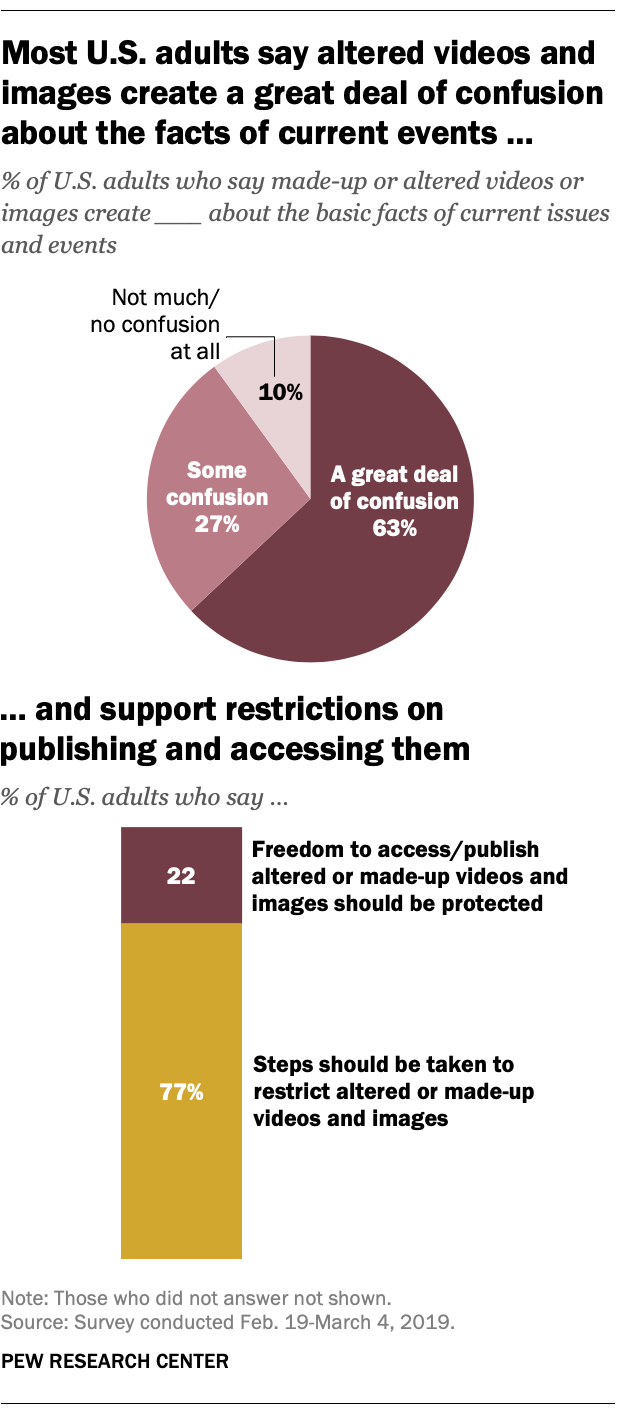The proliferation of altered videos – some of which are known as “deepfakes” – has sparked concern in recent years, particularly as a growing share of Americans now get news from online video-sharing sites such as YouTube. Overall, the U.S. public sees altered videos and images as a major problem and believes action should be taken to stop them, a recent Pew Research Center survey found.
 Nearly two-thirds of Americans (63%) say made-up or altered videos and images create a great deal of confusion about the facts of current issues and events, with another 27% saying they create some confusion, according to the survey, conducted Feb. 19-March 4, 2019. Just one-in-ten say these videos and images create not much confusion or none at all.
Nearly two-thirds of Americans (63%) say made-up or altered videos and images create a great deal of confusion about the facts of current issues and events, with another 27% saying they create some confusion, according to the survey, conducted Feb. 19-March 4, 2019. Just one-in-ten say these videos and images create not much confusion or none at all.
Meanwhile, roughly three-quarters of U.S. adults (77%) say steps should be taken to restrict altered videos and images that are intended to mislead. Far fewer (22%) favor protecting the freedom to publish and access them.
Underlying this high level of concern is the substantial reach that altered videos have. About two-thirds of Americans (66%) say they at least sometimes come across altered videos and images that are intended to mislead, with 15% encountering them often. One-third (33%) say they hardly ever or never come across altered videos or images.
Overall, Americans largely say the public should not be expected to know when a video or image has been altered or made up entirely. About six-in-ten U.S. adults (61%) say it is too much to ask of the average American to be able to recognize altered videos and images, while fewer than half (38%) say the public should be able to recognize them.
Notably, Americans have somewhat more faith in their own ability to recognize altered videos. About half (53%) say it is easy for them to recognize this type of altered content when they come across it, while 46% say it’s hard for them to recognize it.
 Overall, Americans place less responsibility on the public – and less faith in their own abilities – to recognize altered videos than they do with other forms of potentially inaccurate or misleading forms of information. The public is less likely to say the average American should be able to recognize altered videos than they are to say the same about made-up news and information, unverified breaking information, one-sided factual information, or satire about an issue or event. Americans are also less likely to say they can easily recognize altered videos themselves than say this about the other four types of misinformation the survey asked about.
Overall, Americans place less responsibility on the public – and less faith in their own abilities – to recognize altered videos than they do with other forms of potentially inaccurate or misleading forms of information. The public is less likely to say the average American should be able to recognize altered videos than they are to say the same about made-up news and information, unverified breaking information, one-sided factual information, or satire about an issue or event. Americans are also less likely to say they can easily recognize altered videos themselves than say this about the other four types of misinformation the survey asked about.
Democrats and Republicans are largely in sync when it comes to the need for action on altered videos and images and on the difficulty of recognizing them. The same portion of both Republicans and Republican-leaning independents and Democrats and Democratic leaners – 77% in both cases – favor restrictions on altered videos over protecting the freedom to publish and access them.
Additionally, about six-in-ten in both parties (61% of Republicans and 62% of Democrats) say the public cannot be expected to recognize altered videos and images. Majorities in both parties also say these videos and images cause a great deal of confusion, though Republicans are somewhat more likely than Democrats to say this (68% vs. 60%). This aligns with Republicans’ overall greater concern about the issue of made-up news and information.



